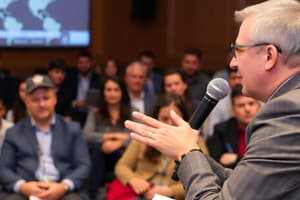Podcast
Questions and Answers
Who are the course instructors?
Who are the course instructors?
Dr. Yasmine Fahmy and Dr. Mohsen Mahrous
What percentage does the final exam contribute to the overall grading?
What percentage does the final exam contribute to the overall grading?
- 30%
- 50%
- 40% (correct)
- 20%
The course has a textbook that students must buy.
The course has a textbook that students must buy.
False (B)
By the end of this course, students should be able to apply principles of audience analysis to create content that resonates with __________ stakeholders.
By the end of this course, students should be able to apply principles of audience analysis to create content that resonates with __________ stakeholders.
What are the different types of technical writing mentioned?
What are the different types of technical writing mentioned?
What is technical communication?
What is technical communication?
Which of the following is NOT a characteristic of technical communication?
Which of the following is NOT a characteristic of technical communication?
The four basic modes of ____________ are verbal, non-verbal, written, and visual.
The four basic modes of ____________ are verbal, non-verbal, written, and visual.
What is context in technical communication?
What is context in technical communication?
What types of procurement documents are mentioned?
What types of procurement documents are mentioned?
Flashcards are hidden until you start studying
Study Notes
Instructors
- Dr. Yasmine Fahmy teaches Part One of the course.
- Dr. Mohsen Mahrous teaches Part Two of the course.
Grading
- Part One activities and assignments will be graded 20%.
- The Mid-Term Exam will be graded 20%.
- Part Two activities and assignments will be graded 20%.
- The Final Exam will be graded 40%.
- Students can upload assignments through the Google Classroom link provided.
Learning Outcomes
- Students should be able to analyze their audience to create content that appeals to them.
- Students should be able to create professional documents tailored to a specific audience.
- Students should be able to document sources accurately using appropriate methods.
- Students should be able to edit and revise written communication to improve clarity.
- Students should be able to design and deliver informative presentations.
- Students should be able to manage public speaking anxiety.
- Students should be able to conduct effective research to gather information for writing.
Text Book
- The course does not use a textbook.
- Students are provided with two reference materials.
Schedule
- Lecture One is on September 29th and covers the introduction to Technical Communication.
- Lecture Two is on October 6th.
- Lecture Three is on October 13th.
- Lecture Four is on October 20th and covers Technical Writing Mechanics.
- Lecture Five is on October 27th and covers Visual Aids and Writing Collaboratively.
- Lecture Six is on November 3rd and covers Presenting Technical Information.
- Lecture Seven is on November 10th and covers Research and Information Gathering.
- November 17th is the Mid-Term Exam.
- Lecture Eight is on November 24th and covers Technical Documentation and Manuals.
- Lecture Nine is on December 1st and covers Proposals and Progress Reports.
- Lecture Ten is on December 8th and covers Laboratory and Project Reports.
- Lecture Eleven is on December 15th.
- A Student Workshop is scheduled for December 29th.
Technical Communication
- Technical Communication is the transfer of technical information.
- Technical Communication is characterized by being:
- Non-abstract and precise
- Accurate and well-documented
- Utilizing numerical data
- Relying heavily on visual aids
- Always technically correct.
- Technical Communication must also consider the following:
- Audience
- Purpose
- Context.
Audience
- When communicating technical information, it is important to determine:
- Audience knowledge
- Needed background information
- Audience motivation
- Required level of detail.
Purpose
- The purpose of Technical Communication may include the following:
- Sharing facts
- Explaining how something works
- Reporting on a project's status
- Requesting funding
- Providing assembly instructions
- Accepting recommendations
- Changing an audience's position
- Encouraging decision-making.
Context
- Context includes items such as history, language, geography, politics, culture, and economics.
- Context can directly affect how the communication is received.
- Understanding and providing context can increase the chances of success.
Types of Technical Communication
- Verbal Communication can include:
- One-on-one discussions
- Team meetings
- Public Communication
- Presentations (verbal with visual aids).
- Types of Technical Writing include:
- Reports
- Emails
- Proposals
- Memos
- Instructions Manuals
- Technical Fliers
- Style sheets
- Press Release
- Technical specifications
- Standard operating procedure
- Technical Standards
- White papers and case studies
- Software Documentation
- Procurement documents
- Troubleshooting Guides
- Academic Writing.
- Types of procurement documents include:
- Request for information (RFI).
Studying That Suits You
Use AI to generate personalized quizzes and flashcards to suit your learning preferences.




